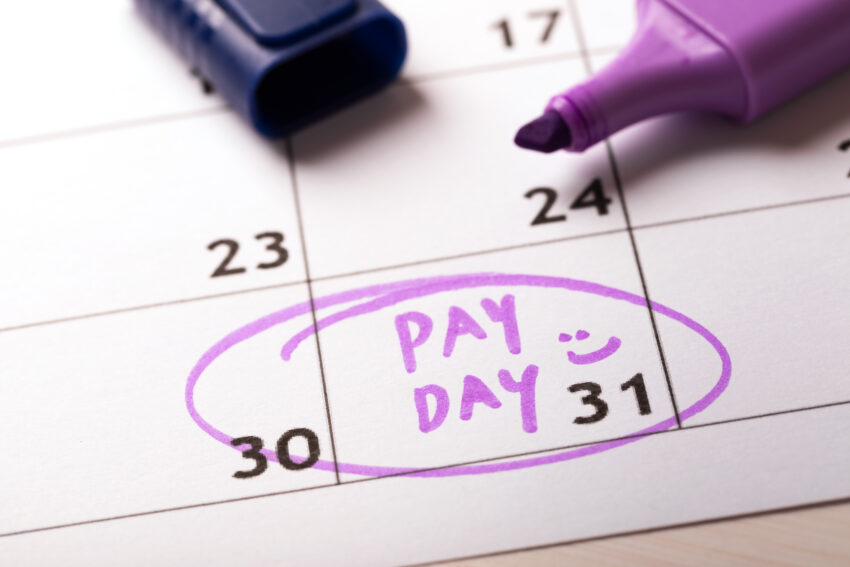Some months may seem longer than others when you’re waiting for payday, especially if you’re struggling to manage your finances or paying off debts.
After payday, you feel optimistic about your finances once you’ve cleared bills and are confident that you have sufficient money to take you through the month. But often, you run out of money a week before payday.
5 Essential Ways To Make Your Money Last Until Payday
The following budgeting and money-saving tips can help you manage your funds until your next payday.
1. Budgeting
You must be good at budgeting to improve your cash flow and ensure your funds last throughout the month. Effective budgeting is an essential factor for financial independence.
Fortunately, apps and online money tools can make budgeting easier. Financial planning apps will help you regulate your spending and prevent you from buying things you can’t afford. You’ll be able to create a reasonable budget that’ll take you through the month.
Before drafting your budget, work out your total earnings and separate your savings from the funds you’ll use to pay bills. Then factor in all essential needs like foods, insurance, mortgage payments, subscriptions, utility bills, etc. Ensure that you stick to your budget and avoid impulse purchases.
2. Track Your Expenditure
Insignificant purchases here and there add up fast, and after a short while, you realise that you’ve overspent. Start tracking your expenditure to determine areas where you overspend unknowingly. Keep your receipts with you and note down purchases in a spending logbook, grouping them so you can point out places where you’re straining to keep your spending in check.
It’s advisable to have more than a single account and allocate your funds to various accounts for different purposes. Open an account for essential costs and ensure you pay your bills using that account. Clear your bills as you as soon as you get paid.
Then open a savings account, and allocate a specific portion of your income to that account. The trick is to set aside your savings even before paying bills. This way, you’ll develop a habit of saving at the beginning of every month. Savings come in handy during a financial crisis or when you want to invest.
Once you’ve taken care of your savings and all essential costs, you can use the remaining cash for luxuries and general spending. Even if the balance is small, you’ll have peace of mind since you have no pending bills.
3. Consider A Payday Loan If Your Money Runs Out
Payday loans come in handy when you have a financial problem and need funds urgently. Even with your money management skills, you can still run out of funds before payday. If everything fails, you can take out a loan from Viva Loans UK.
As long as you borrow from a responsible lender and borrow amounts you can afford to repay comfortably, you have nothing to worry about. If you are unemployed or have a bad credit score, consider other alternatives before settling on payday loans.
Viva Loans has favourable terms to meet urgent financial needs. So don’t hesitate to take out a loan from the platform if you run out of money before payday.
4. Try Improving Your Financial Health
Minor adjustments can go a long way in improving your financial health. You can try:
Cut Back On Luxuries
We aren’t suggesting you do away with holidays altogether—that’s unrealistic. As the popular saying goes, all work and no play makes Jack a dull boy!
However, you can go over your spending habits and identify two or three luxuries you can do without. That way, you’ll save up some cash for rainy days.
You can try not buying new clothes now and then or even cancel your multiple appointments at the hair salon.
Create Meal Plans
If you want to save some coins, cutting back on take-out should be the first thing you do. You can try creating a meal plan. This will help reduce the cost of grocery shopping. Additionally, planning meals also reduces waste.
Stop Using Your Debit Card
If you are prone to overspending, you should consider ditching your debit card. Sure, it’ll feel a bit awkward at first, but you’ll get used to it.
Only carry along money you can afford to spend when you go out. Doing this will have a significant impact on your finances.
Distribute Your Bills Across The Month
Splitting every month into four weeks instead of looking at it as a whole can be very effective. Instead of having bills deducted from your account at the start of each month, look into when they’re due and spread them across the month.
5. Save Before You Make Big Purchases
Delaying gratification will make you better at managing your finances. Instead of using a credit card or sacrificing essentials to make a big purchase, you’ll have time to reflect on whether the big purchase is worth it.
You’ll also avoid the hefty interest rates on credit cards when you opt for saving before making a big purchase.
Additionally, you won’t have to deal with the consequences of failing to meet your financial obligations regarding debt repayment.
Wrap Up
You’re not the only one struggling to get by with your salary. As the cost of living increases, many people have concerns that their wages can’t cover their expenses. However, as long as you can get organised and make a few sacrifices, you’ll see how these small changes can make a huge impact.


